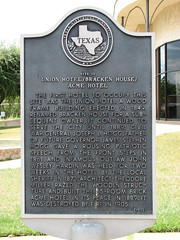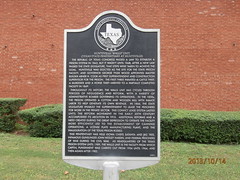John Wesley Hardin
Commemorated on 8 plaques
Texas Historical Marker #01011
Community of Pilgrim. Named in honor of Thomas J. Pilgrim (1804-1877), noted pioneer educator. Born in Connecticut, he came in 1828 to Texas, where in 1829 he organized a school at San Felipe, in Stephen F. Austin's Colony. Also started first Sunday School in Texas. In 1838 he received a land grant of 1,476 acres (including this site) from Texas Republic. Settled in Gonzales in 1840; started a Sunday School and was superintendent until 1871. Community became a prominent trading post in early 1840s and a hideout of famous gunman John Wesley Hardin in 1870s. #1011
?, Pilgrim, TX, United States where they hid
Texas Historical Marker #01034
Concordia Cemetery. Known as Concordia during the 1840s, this area was the home of Chihuahua trader Hugh Stephenson. In 1856 his wife, Juana (Ascarate), was buried in what is now part of Concordia Cemetery. The graveyard gained widespread use in the 1880s when El Pasoans drove three miles to Concordia to bury their dead. By 1890 various sections had been purchased by different groups and were designated Catholic, Masonic, Jewish, Black, Chinese, Military, Jesuit, city, and county. Buried here are gunfighter John Wesley Hardin, and numerous civic leaders, pioneers, and war veterans. (1984) Concordia Cemetery Established 1856 Historic Texas Cemetery - 2005 #1034
3800 W. Yandell, El Paso, TX, United States where they was buried (1895)
Texas Historical Marker #02820
Hardin, John Wesley. Champion gunfighter in personal combat, Hardin was brought to justice for first time for murder of Deputy Sheriff Charles Webb here in Comanche in 1874. Served 15 years in prison. On release, opened law office in El Paso, 1894. Killed at age of 42 when shot in back, 1895. (1966) #2820
?, Comanche, TX, United States where they was
Texas Historical Marker #06864
Site of the Union Hotel/Bracken House/Acme Hotel. The first hotel to occupy this site was the Union Hotel, a wood frame building erected in 1849. Renamed Bracken House for a subsequent owner, it continued to serve the city until 1889. Civil War General Joseph L. Hogg, father of future Governor James Stephen Hogg, gave a rousing patriotic speech from the front steps in 1861, and infamous outlaw John Welsey Hardin was held for two weeks in the hotel by the local sheriff in 1872. Architect Theodore Miller razed the wooden structure and built the 65-room brick Acme Hotel in its place in 1889. It was destroyed by fire in 1905. #6864
?, Rusk, TX, United States where they was imprisoned
Texas Historical Marker #10395
Near Boyhood Home of John Wesley Hardin. (1853-1895) Notorious outlaw who killed over 30 men. son of a Methodist minister. "Wes" was an ardent southerner. His resistance to Union occupation troops made him a hero and set him on his lawless career. He always claimed he shot only in self defense. He was killed in El Paso, 1895. #10395
?, Moscow, TX, United States where they lived near
Texas Historical Marker #11857
John Wesley Hardin. (May 26, 1853 - August 19, 1895) Born in Bonham, Texas, John Wesley Hardin was named for the founder of Methodism. "Wes" Hardin grew into a family man, cowboy, and outlaw who claimed to have killed more than 30 men. An unusual sort of gunslinger, Hardin considered himself a pillar of society who killed to save his own life. Hardin served 15 years in state prison for murder, was pardoned, then opened a law office in El Paso in May 1895. He was killed 3 months later by John Selman, an El Paso city constable. (1998) #11857
?, El Paso, TX, United States where they was
Texas Historical Marker #12577
Huntsville "Walls" Unit. (Texas State Penitentiary at Huntsville) The Republic of Texas Congress passed a law to establish a prison system in 1842, but it wasn't until 1848, after a new law passed the state legislature, that steps were taken to achieve the goal. Huntsville was selected as the site for the state prison facility, and Governor George Tyler Wood appointed master builder Abner H. Cook as first superintendent and construction supervisor for the prison. The first three inmates -- a cattle thief, a murderer and a horse thief -- arrived to a partially completed facility in 1849. Throughout its history, the Walls Unit has cycled through periods of negligence and reform, with a variety of administrative boards governing its operations. In the 1850s, the prison operated a cotton and woolen mill with inmate labor to help generate its own revenue. In 1866, the state legislature enabled the superintendent to lease the prisoners for work in the private sector. This convict lease system lasted until the reform movement in the early 20th century accomplished its abolition in 1910. Additional reforms and a need created during the Great Depression to operate the facility more efficiently led to the establishment of canning operations, a license plate manufacturing plant, and the inauguration of the Texas Prison Rodeo. This penitentiary has held Kiowa chiefs Satanta and Big Tree, infamous gunslinger John Wesley Hardin, and Federal prisoners of war during the Civil War. As headquarters of the Texas prison system until 1989, the Walls Unit is the facility from which capital punishment was carried out from 1924 until 1964, and then again after 1982. (2001) #12577
?, Huntsville, TX, United States where they was imprisoned
Texas Historical Marker #17341
Charlie Webb and John Wesley Hardin. #17341
?, , TX, United States where they was




